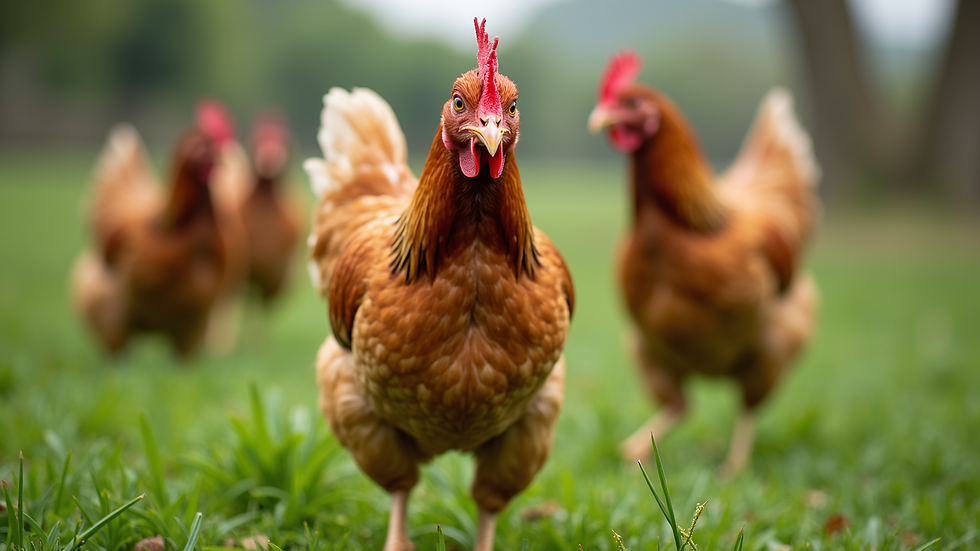Sustainable Poultry Husbandry Practices for Eco-Conscious Farming
- Brandon Walls
- Aug 7, 2025
- 4 min read
In today's world, where environmental concerns are at the forefront, sustainable farming practices are more important than ever. Poultry farming, in particular, has a significant impact on the environment. However, with the right practices, farmers can raise chickens in a way that is both productive and eco-friendly. This blog post will explore sustainable poultry husbandry practices that can help eco-conscious farmers thrive while protecting our planet.
Understanding Sustainable Poultry Farming
Sustainable poultry farming focuses on methods that minimize environmental impact while ensuring animal welfare and economic viability. This approach considers the entire lifecycle of poultry production, from breeding to processing. By adopting sustainable practices, farmers can reduce waste, conserve resources, and promote biodiversity.
Benefits of Sustainable Poultry Practices
Implementing sustainable practices in poultry farming offers numerous benefits, including:
Environmental Protection: Reducing pollution and conserving natural resources.
Animal Welfare: Ensuring that chickens are raised in humane conditions.
Economic Viability: Lowering costs through efficient resource use and potentially increasing market demand for sustainably raised poultry.
Key Sustainable Practices in Poultry Husbandry
1. Integrated Pest Management (IPM)
Integrated Pest Management is a holistic approach to controlling pests in poultry farming. Instead of relying solely on chemical pesticides, IPM combines various strategies, such as:
Biological Control: Introducing natural predators to control pest populations.
Cultural Practices: Rotating crops and using resistant breeds to minimize pest issues.
By using IPM, farmers can reduce chemical use and promote a healthier environment.
2. Free-Range Systems
Free-range systems allow chickens to roam outdoors, providing them with a more natural lifestyle. This practice has several advantages:
Improved Animal Welfare: Chickens have space to engage in natural behaviors, leading to healthier and happier birds.
Better Quality Products: Free-range eggs and meat often have superior taste and nutritional value.
Farmers can implement free-range systems by providing secure outdoor spaces and ensuring that the chickens have access to fresh air and sunlight.
3. Organic Feed
Using organic feed is another sustainable practice that benefits both the environment and the chickens. Organic feed is made from crops grown without synthetic fertilizers or pesticides. This practice offers several benefits:
Healthier Chickens: Organic feed can lead to better overall health and reduced disease rates.
Reduced Chemical Runoff: By avoiding synthetic inputs, farmers help protect local waterways and ecosystems.
Farmers can source organic feed from local suppliers or grow their own grains to reduce transportation emissions.
4. Waste Management
Effective waste management is crucial for sustainable poultry farming. Chicken manure can be a valuable resource if managed properly. Here are some strategies:
Composting: Turning manure into compost can enrich soil and reduce the need for chemical fertilizers.
Anaerobic Digestion: This process converts manure into biogas, which can be used for energy.
By managing waste effectively, farmers can minimize pollution and create valuable resources for their farms.
5. Water Conservation
Water is a precious resource, and poultry farming can consume a significant amount. Implementing water conservation practices can help reduce usage. Some strategies include:
Rainwater Harvesting: Collecting rainwater for use in poultry operations.
Efficient Watering Systems: Using nipple drinkers or automatic systems to minimize water waste.
By conserving water, farmers can lower costs and reduce their environmental footprint.
The Role of Technology in Sustainable Poultry Farming
Technology plays a vital role in promoting sustainable poultry practices. Innovations such as precision farming tools and data analytics can help farmers make informed decisions. For example:
Monitoring Systems: Sensors can track environmental conditions, ensuring optimal living conditions for chickens.
Data Analysis: Analyzing data on feed efficiency and growth rates can help farmers optimize their operations.
By embracing technology, farmers can enhance sustainability while improving productivity.
Community Engagement and Education
Sustainable poultry farming is not just about individual practices; it also involves community engagement. Farmers can share knowledge and resources with one another. Here are some ways to foster community involvement:
Workshops and Training: Organizing events to educate fellow farmers about sustainable practices.
Collaborative Projects: Partnering with local organizations to promote sustainable agriculture in the community.
By working together, farmers can create a more sustainable future for poultry farming.
Challenges and Solutions
While sustainable poultry farming offers many benefits, it also comes with challenges. Some common obstacles include:
Initial Costs: Implementing sustainable practices may require upfront investment.
Market Demand: Not all consumers prioritize sustainability when purchasing poultry products.
To overcome these challenges, farmers can:
Seek Grants and Funding: Many organizations offer financial support for sustainable farming initiatives.
Educate Consumers: Raising awareness about the benefits of sustainably raised poultry can help increase demand.
Real-Life Examples of Sustainable Poultry Farms
Several farms around the world are leading the way in sustainable poultry husbandry. Here are a few inspiring examples:
Polyface Farm (USA): Known for its innovative rotational grazing practices, Polyface Farm raises chickens in a way that enhances soil health and promotes biodiversity.
The Happy Egg Co. (UK): This company focuses on free-range egg production, ensuring that hens have access to outdoor spaces and a natural diet.
These farms demonstrate that sustainable practices can be both profitable and environmentally friendly.
The Future of Sustainable Poultry Farming
As the demand for sustainable products continues to grow, the future of poultry farming looks promising. Farmers who adopt eco-friendly practices will likely find new opportunities in the market. Additionally, advancements in technology and research will continue to support sustainable methods.
Embracing Sustainable Practices for a Better Tomorrow
Sustainable poultry husbandry practices are essential for eco-conscious farming. By implementing strategies such as integrated pest management, free-range systems, and organic feed, farmers can create a more sustainable future. The benefits extend beyond the farm, contributing to environmental protection and animal welfare.
As we move forward, it is crucial for farmers, consumers, and communities to work together. By supporting sustainable practices, we can ensure a healthier planet for future generations. Embracing these practices is not just a trend; it is a responsibility we all share. Together, we can make a difference in the world of poultry farming and beyond.



Comments